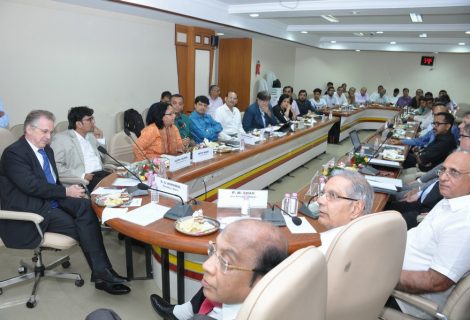“India is ideal for SMEs”
SHInsight: Mr. Nebel, OPTANIUM’s solutions improve CRM processes in companies of all sizes and reduce IT costs. Most of these programs are distributed in the German-speaking countries, while the software is produced exclusively in India. Why there?
Marcel Nebel: India is ideal for medium-sized companies, which are known to mind their budgets – not just in the IT sector. The wages and salaries are cheap, the quality of the work is very good. You have practically inexhaustible numbers of qualified employees, even if it is not always easy to find those that fit a German company.
Despite lots of advantages of India, German SMEs are sometimes very skeptical. Can you understand that?
There are still many prejudices which are, despite the differences between the two cultures, just that: prejudices. The IT industry is not entirely innocent of this. Many “IT-Indians” have done a very good job for and in Germany. But there are also big cultural differences that both sides have tried to suppress. The result are subsequent misunderstandings on both sides, some still exist today. Of course, while it is primarily about business, raising awareness for differences is a matter of mutual respect and ultimately not really costly. The yield is worth the effort in any case.
How do you deal with this in your Indian branch in Chennai?
First of all, I’m on site regularly. This presence is important, although of course there is a local manager or office manager. Then one should find a living compromise between Indian and German office life. India is structured very hierarchically. To ask questions or make suggestions for changes is often perceived as criticism of the superior and therefore avoided. I, on the other hand, encourage my employees to actively get involved and to question positions. And I show them that I value everyone regardless of their job.
It is said again and again that Indian employees do not act independently and need constant control.
I know these concerns, but I cannot confirm them. Again, it is important to determine the direction of self-initiative. The Indian education system is more focused on reproducing than discursive exchange. In fact, Indian graduates cannot be compared to Germans. But in the Indian professional life you have to prove yourself quickly. For example, we hire only employees who have at least three years of work experience and have proven that they can make their own decisions. Of course, that’s the challenge: finding these employees. There should not be much experiments. In case of doubt, rely on the experience of India connoisseurs.
Did Prime Minister Narendra Modi really change the country as positively as he promised when he took office?
It was in transition before 2014, but Modi continued to drive this development. Of course, there is still much to improve, for example, in terms of infrastructure in some areas. But just for the economy, for example, the legal security was enormously reinforced, take only the tax standardization of GST, the cadastral order or the general introduction of the electronic identity card. The latter, for example, makes it much harder for applicants to “brighten up” their careers.
Your top 5 advices for European entrepreneurs looking to invest in India?
- Be sure to install a trusted person.
- Be patient and follow a real strategy.
- Conduct qualified market research.
- Do good self-marketing to retain good staff. The image of the employer plays a big role for Indians.
- Be an active part of the local business network.






